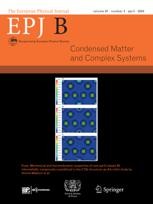Assessing the environmental impacts of Brazil’s biofuel sector
Mathematical analysis reveals that within Brazil’s agriculture and livestock industry, the biofuels sector is most heavily reliant on other sectors with high greenhouse gas emissions.
New York | Heidelberg, 13 August 2024
 Brazil is a world leader in biofuel production, but the environmental sustainability of the sector has faced criticism due to its impacts on deforestation, water use, and biodiversity, especially in the Amazon rainforest.
Brazil is a world leader in biofuel production, but the environmental sustainability of the sector has faced criticism due to its impacts on deforestation, water use, and biodiversity, especially in the Amazon rainforest.
Through analysis published in EPJ B, researchers led by Eder Johnson de Area Leão Pereira at the Federal Institute of Maranhão reveal new insights into the biofuel industry's dependence on high greenhouse gas (GHG) emitting sectors.
The study shows that within Brazil’s agriculture and livestock industry, the biofuel sector relies most heavily on other sectors that contribute significantly to GHG emissions. The team hope their results could contribute to discussions about threats the sector poses to Amazon rainforest, and its overall impact on global climate change.
Today, Brazil produces an abundance of biofuels from sources such as sugarcane, vegetable oils, and animal fats. In 2018 alone, production reached over 33 billion litres of ethanol and 5.3 billion litres of biodiesel, making a substantial contribution to the production of renewable fuels. However, the environmental impacts of this production have raised questions about whether biofuels can effectively mitigate GHG emissions, highlighting the need to quantify their sustainability.
To investigate, Johnson de Area Leão Pereira’s team carried out a detailed analysis of the ecological network of Brazil’s agriculture and livestock industry. This mathematical method analyses interactions between different economic sectors and their contributions to GHG emissions, allowing the researchers to assess the centrality of the biofuel sector in Brazil’s overall GHG emissions.
Using this technique, the team discovered that along with the tobacco, food, and beverage sectors, biofuel production is the most dependent on other high GHG-emitting sectors. They now hope their results will contribute to discussions about the environmental threats the biofuel industry poses.
These insights could be pivotal in guiding future policies to make agriculture and livestock more sustainable in Brazil, and may ultimately underscore the need for Brazil to focus on other forms of renewable energy to achieve its emissions goals.
Reference: de Area Leão Pereira, E.J., Diele-Viegas, L.M. & de Santana Ribeiro, L.C. GHG emissions in Brazilian Agriculture and livestock sectors and the risk to Amazonia conservation. Eur. Phys. J. B 97:94 (2024). https://doi.org/10.1140/epjb/s10051-024-00720-5
Further Information
For more information visit: www.epj.org
Services for Journalists
The full-text article is available here.
Contact
Sabine Lehr | Springer | Physics Editorial Department
tel +49-6221-487-8336 | sabine.lehr@springer.com
